
Panelists discuss how outdated coverage models lag behind oncology innovation, calling for dynamic policies that reflect evolving clinical evidence.

Panelists discuss how outdated coverage models lag behind oncology innovation, calling for dynamic policies that reflect evolving clinical evidence.

Panelists discuss how step edits hinder timely cancer treatment and urge policies that prioritize evidence-based access over cost-driven sequencing.

Panelists discuss how utilization management policies can delay oncology care and call for reforms that better align oversight with clinical evidence.

Panelists discuss how PBMs shape oncology access and stress the need for transparency to align financial control with clinical priorities.
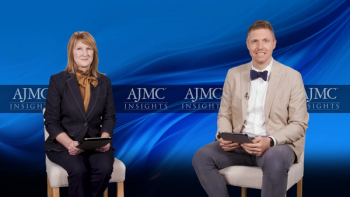
Panelists discuss how digital therapeutics could address the enormous unmet need for treating negative symptoms in the 60% of patients with schizophrenia who experience them, potentially reducing health care costs and improving quality of life.

Panelists discuss how prescription digital therapeutics like Daylight show promise for treating depression and anxiety but face significant accessibility barriers due to lack of payer coverage and high out-of-pocket costs.
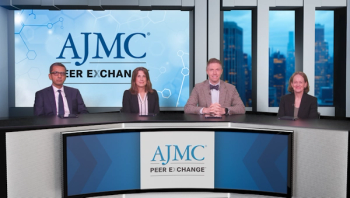
Panelists discuss how structured, multidisciplinary screening efforts can catch MASH earlier and prevent progression.

Panelists discuss how metabolic dysfunction drives liver injury, highlighting early recognition of the obesity–MASH connection as key to prevention.

Panelists discuss how aligning evolving payer policies with real-world oncology practice is key to sustaining timely and equitable patient access.

Panelists discuss how national policy reforms are reshaping oncology care by balancing affordability efforts with the need to preserve access and innovation.

Panelists discuss how negative symptoms like lack of motivation, social withdrawal, and impaired expression significantly impact patients’ ability to maintain relationships and employment, representing a challenging aspect of care with limited effective treatment options.

Panelists discuss how physician assistants play an essential role in addressing the critical shortage of psychiatrists, particularly in rural areas, where 55% of US counties lack a single psychiatric provider and 143 million Americans live in psychiatric shortage areas.

Oncology experts at PCOC 2025 discuss breakthrough therapies, AI-driven care, and evolving care delivery models shaping the future of oncology.
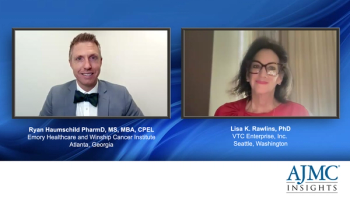
Panelists discuss how managed care organizations can leverage prescription digital therapeutics as cost-reduction tools to address quality metrics and offset financial impacts from health care policy changes while identifying education of providers about workflow impacts and value propositions as the biggest unmet need for wider adoption in mental health conditions.

Panelists discuss how insurance coverage for prescription digital therapeutics remains uneven due to uncertain reimbursement pathways, lack of awareness among health care leaders, challenges in demonstrating cost-effectiveness, provider workflow concerns, and technical barriers including coding issues and limited electronic health record integration.

Panelists discuss how prescription digital therapeutics differ from traditional pharmaceuticals by following FDA medical device approval pathways focused on clinical performance and safety rather than chemistry and manufacturing while offering potential economic value by extending behavioral health capacity to underserved populations, especially in rural areas with limited mental health professionals.

Panelists discuss how schizophrenia imposes significant economic costs across direct medical expenses, nonmedical expenses, and indirect costs, with negative symptoms particularly amplifying the burden by reducing patient engagement, work capacity, and treatment adherence while increasing relapse risk and total cost of care.
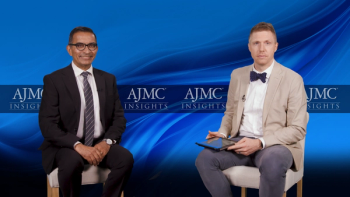
Panelists discuss how prescription digital therapeutics will ideally be used in combination with traditional medications to provide optimal outcomes, particularly for patients hesitant about medication or those in early stages of illness where diagnostic certainty may be evolving.

Panelists discuss how the CONVOKE clinical trial was designed as a 16-week study focusing specifically on patients with negative symptoms, incorporating patient input in app development and showing improvements in negative symptoms, depression, and cognitive function even in chronically ill patients.

Panelists discuss how prescription digital therapeutics are currently used in clinical practice, noting that while none are yet approved for schizophrenia, CT-155 shows promise in phase 3 trials, and existing PDTs like Rejoyn for depression demonstrate the potential for technology-based interventions.

Panelists discuss how prescription digital therapeutics can serve the psychological and social components of schizophrenia treatment while potentially improving medication adherence, similar to how digital monitoring tools enhance outcomes in other chronic conditions like diabetes and hypertension.

Panelists discuss how the global shortage of psychiatrists contributes to patient burden by necessitating expanded training for other health care professionals, including nurse practitioners, physician assistants, primary care doctors, and law enforcement to recognize and manage schizophrenia symptoms.

Panelists discuss how negative symptoms create significant patient burden by appearing during the prodromal period in late adolescence and requiring a comprehensive biopsychosocial treatment approach that addresses biological, psychological, and social aspects of care.

Oncology stakeholders are navigating new policies as the landscape quickly evolves, according to Ryan Haumschild, PharmD, MS, MBA, CPEL.
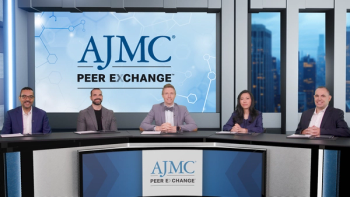
Panelists discuss how successful access initiatives include integrated specialty pharmacies, community-based clinics, clinical trial opportunities, telehealth services, and financial assistance programs like 340B to serve underserved populations with atopic dermatitis.

Panelists discuss how diverse clinical trial data help build patient trust by demonstrating therapy effectiveness in similar populations and address barriers like health care mistrust and representation in treatment development.

Panelists discuss how negative symptoms of schizophrenia differ from positive and cognitive symptoms, explaining that negative symptoms involve withdrawal, flat affect, and poverty of thought rather than the more visible hallucinations and delusions of positive symptoms.

Panelists discuss how recent clinical trials like ADmirable and DISCOVER intentionally enrolled patients with skin of color (Fitzpatrick types IV-VI), demonstrating similar efficacy and safety profiles for biologics across diverse racial populations, with more than 70% achieving a 75% or greater improvement in the Eczema Area and Severity Index (EASI-75).

Panelists discuss how historical underrepresentation of patients with darker skin tones in clinical trials has limited understanding of treatment efficacy and safety across diverse populations, hampering real-world clinical decision-making.

Panelists discuss how health care providers need coordinated multidisciplinary care teams, visual resources like databases for eczema in skin of color, peer-to-peer educational sessions, and case-based learning to better recognize and manage atopic dermatitis (AD) across diverse skin tones.

259 Prospect Plains Rd, Bldg H
Cranbury, NJ 08512
© 2025 MJH Life Sciences®
All rights reserved.
